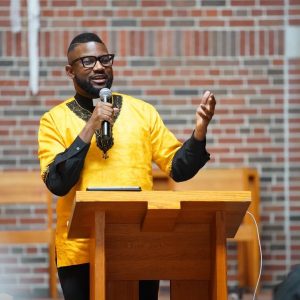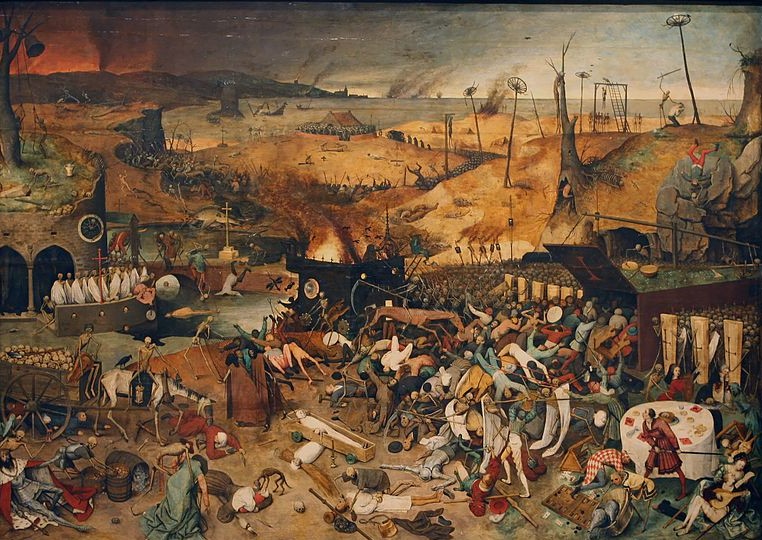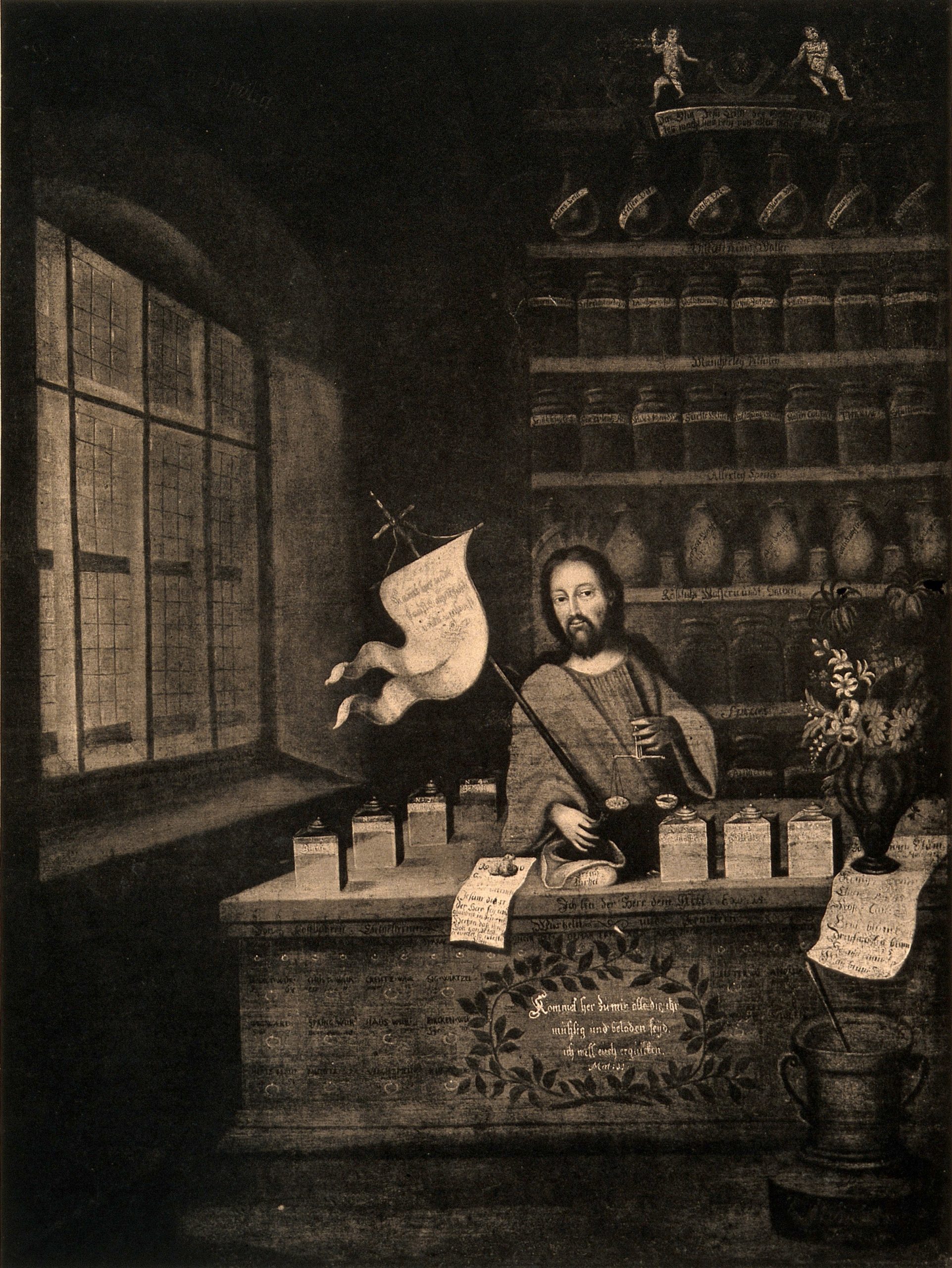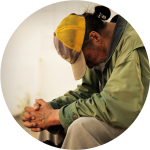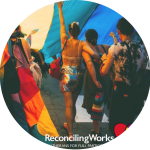Ending hunger goes beyond providing calories. The ministry of ELCA World Hunger and the work we support together is about recognizing the significance of food and the ways it can bring us together with one another, with God, and with all of creation. In the sacrament Christ initiated on Maundy Thursday, we glimpse what the banquet table God has promised for our future might look like. Today, with churches closed and many fasting from the sacrament until we can be together again, the story of the first Maundy Thursday is particularly poignant. It reminds us of God’s presence at the many tables we dine at, and it reminds us of the powerful way God’s gift of food can bring us together in anticipation of that day when all will be fed.
In this spirit, Pastor Tim Brown offers a plan for an intentional meal at home for Maundy Thursday. Pr. Tim is a Gifts Officer and Mission Ambassador for the Lutheran School of Theology at Chicago and a pastor and writer out of Raleigh, NC. You are invited to use the message below for personal devotion as well as prompts for sermon writing.
Maundy Thursday Family Feast
Below is a full reflection with additional ideas. Here is a quick guide you can print and follow with your family: Family Maundy Thursday Quick Guide
Maundy Thursday is an observance of intention. The word “maundy” is taken from “maundatum” or “mandate,” where Jesus commands his followers to love one another.
The whole observance is a story in three parts: confession and forgiveness, acts of service, and a meal of love. For an adapted family service around the table, a simple prayer will suffice for confession and forgiveness on this night and will open the observance with sacred empty space. The washing and meal that follow can be done with as much joy or as much solemnity as your family dynamics dictate. Remember that the point of this observance is not to feel anything in particular, but rather to participate in a larger story that these holy days narrate.
It’s also important to note that, while your family meal is certainly sacred, this is not the Sacrament of Holy Communion and not a “Christian Seder.” This is recalling what every Eucharist reminds us: every shared meal is ordinary and extraordinary, and Christ is present in our gathering whenever we dine in fellowship.
 Decide What You Want to Eat for Dinner
Decide What You Want to Eat for Dinner
So, what should you eat for dinner? Frankly, you’re welcome to eat whatever you’d most enjoy on this night. If you want a more traditional Middle Eastern meal, not unlike the food Jesus may have eaten, grapes, dates, figs, olives, and some crusty bread are good additions to the table if everyone enjoys them. Perhaps some crackers and hummus, too. But if these aren’t in your usual diet or don’t agree with your palate, the point is not to re-enact a meal, but to have a meal, together. Eat what you’d like.
If, as part of your Holy Week observance you’ve made some bread, enjoy that on this night. Bread-baking as a family is a time-honored tradition that spans cultures and ages. Remember to enjoy the gathering, don’t sweat the details too much and just do everything with intention.
Gather Around the Table
To begin, gather the family together around the table, standing or seated. Invite everyone to take a deep breath and quiet themselves. Light some candles to use as a centerpiece for the table if you have them. If using candles is unwise, or they aren’t available, just take some time to be quiet in God’s presence.
 Talk Together
Talk Together
After a while, invite everyone to share their favorite memory that involves a meal. It could be a favorite dish from childhood, a time they shared food with someone at school or on a trip, a special event that they attended, or even a perennial meal they enjoy. What do they enjoy about it? Why?
Pray Together
Then, invite someone to offer a prayer with these, or similar, words. Note that the prayer should both give thanks for the gift of shared meals and food and also acknowledge that we too often ignore the hungry around us. In this way the prayer is both an act of praise and confession.
“Gracious God, you give us good things to eat and invite us to share with one another. Thank you for the many ways you feed our minds, feed our hearts, and the very real ways you feed our bellies each day. We also know that we do not share our food, our minds, and our hearts in the ways that you would have us. For the ways we don’t give of ourselves and our resources, we ask you forgiveness. And for the many ways you sustain us, we give you thanks. On this holy night when Jesus shared his last meal with his friends, we remember the great gift it is to eat and spend time with one another. Thank you for this meal, for this holy night, and for all your gifts. Amen.”
Wash Each Other’s Feet or Hands
Invite everyone to be seated with their chairs facing outward, away from the table. Have a bowl of substantial size nearby, like a mixing bowl, a pitcher or larger cup of warm water and a towel for drying.
Invite someone to read John 13:1-17, the story of Jesus washing the feet of the disciples. After you’ve  read the story, say the following (or something like it):
read the story, say the following (or something like it):
“On this night we have heard our Lord’s commandment to love one another as he has loved us. We who receive God’s love in Jesus Christ are called to love one another, to be servants to each other as Jesus became our servant. Our commitment to this loving service is signified in the washing of feet, following the example our Lord gave us on this night.”
Then invite each family member, in turn, to wash one foot of another member of the family, carefully drying it. Only one foot is necessary, and each person should take a turn. If foot washing is not preferable, you can do hand washing instead, though there is something particularly special and intimate about foot washing.
If you’re performing this ritual with children, it’s natural for them to laugh and giggle during this. This is OK! This night should be about enjoyment as much as it is about sacred acts. Often, they are one and the same. During the foot-washing, it’s appropriate to sing if your family is a singing family. “Come by Here” is a great option, or even just a verse of a familiar song like “Amazing Grace” or “Jesus Loves Me” works well.
After foot-washing, you can invite people to wash their hands and turn their chairs to face back toward the table for the meal.
Eat Together
After everyone is seated and ready, enjoy the meal! Invite people to share reflections about their day, or perhaps ask them what they liked or didn’t like about the foot washing. You can ask those gathered what love means, how they like to best express love, and what the most beautiful act of love they’ve ever seen was.
Tell the Story Together
Toward the end of the meal, but before you’re completely done, invite everyone to quiet back down as you tell the story of the meal portion of the last supper. During this part, I encourage you not to lift up any bread or wine, but if there is bread on the table or a drink, you can reference it as a reminder of the meal. Read 1 Corinthians 11:23-26, recalling Jesus’ last supper.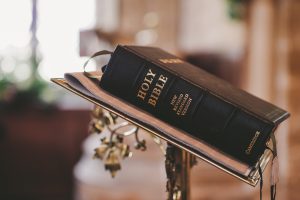
Then say these words, or something similar:
“Tonight we have participated in a supper like Jesus’ last as his disciples gathered together around him. The Gospels tell us that after supper Jesus and his disciples sang a hymn together and went out to the Mount of Olives. You’ll be given a few minutes to eat just a bit more and have another few sips, and then we’ll begin cleaning up quietly, without any loud talking, taking any dishes to the kitchen sink, wiping down tables, and sweeping up. Everyone gets to help. After we clean up, we’re going to stay pretty quiet the rest of the night to honor this holy night.”
Clean Up
Invite everyone to clean up quietly. On this night where it’s tradition to strip the altar and take everything out of the sanctuary, you may want to take your clean up a little farther by sweeping the whole room, washing down the tables and chairs and countertops, and even keeping the table free from adornments like table cloths or candles. Make everything bare.
After the clean-up is done, invite everyone back around the table for a final prayer saying these words, or something similar:
“I’m glad we got to share this time together tonight! As we remember Jesus’ last meal, let’s keep honoring it by spending some time together. But before we do that, let’s pray, ‘Thank you, God, for this most holy night, and for Jesus’ example of love. Help us to love each other, and ourselves, as you love us, and may we always remember the deep love shown through Jesus, a love that will do anything for us. Give us a holy rest tonight, a sweet sleep, so that we may rise to praise you in the morning. Amen.”
Enjoy a Quiet Night Together
Then decide on a family how you will spend the rest of the night! You can read quietly together, or maybe read aloud all from one book. You can play a family game together, listen to music, or if it’s  getting late for young children, a bath and story-time is very appropriate. In these days of shelter-in-place when screen-time has probably been at a premium, this is a perfect night to keep all screens off and keep visual distractions to a minimum, including phone distractions.
getting late for young children, a bath and story-time is very appropriate. In these days of shelter-in-place when screen-time has probably been at a premium, this is a perfect night to keep all screens off and keep visual distractions to a minimum, including phone distractions.
A Maundy Thursday service in the home should both feel distinct from a normal night routine, and also very familiar. After all, Jesus’ last supper was, at its heart, a simple meal with his friends. Though this Maundy Thursday doesn’t look like many in our lifetime, it can still honor the holiness of the night when done with a little preparation, intention, and a lot of sacred joy.
 Hospitality is a bedrock value in Arabic culture. Anthropologists say it probably arose from the harsh desert conditions in the Middle East and the need to offer food, drink and rest to travelers who might appear at your dwelling. Without hospitality such visitors could die. So important is this value for Arab Christians and Muslims that it has become ritualized. You will get pretty much the same treatment in the home of any Arab or Arab-American.
Hospitality is a bedrock value in Arabic culture. Anthropologists say it probably arose from the harsh desert conditions in the Middle East and the need to offer food, drink and rest to travelers who might appear at your dwelling. Without hospitality such visitors could die. So important is this value for Arab Christians and Muslims that it has become ritualized. You will get pretty much the same treatment in the home of any Arab or Arab-American.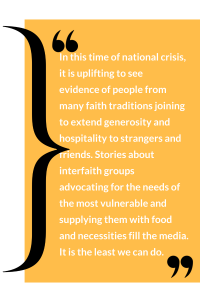
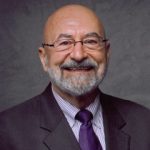 Our guest blogger, Dr. Ryan A. LaHurd, formerly served as president of Lenoir-Rhyne University, Hickory, N.C. in 2002, which is an ELCA higher education institution. Dr. LaHurd, an Arab-American of Lebanese ancestry, has served as a teacher, administrator, author and leader in many capacities, including with the ELCA Association of Lutherans of Arab and Middle Eastern Heritage.
Our guest blogger, Dr. Ryan A. LaHurd, formerly served as president of Lenoir-Rhyne University, Hickory, N.C. in 2002, which is an ELCA higher education institution. Dr. LaHurd, an Arab-American of Lebanese ancestry, has served as a teacher, administrator, author and leader in many capacities, including with the ELCA Association of Lutherans of Arab and Middle Eastern Heritage.

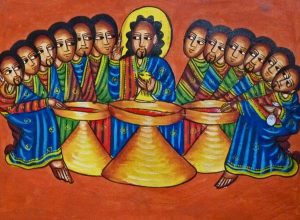
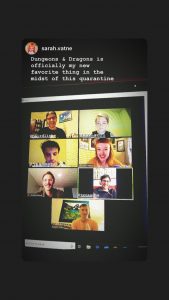
 Baird Linke lives in the Twin Cities where he works with Calvary Lutheran Church as their director of faith formation and community engagement. He’s a nerd for ecology, theology, the outdoors, and running. He currently studies with Wartburg Theological Seminary.
Baird Linke lives in the Twin Cities where he works with Calvary Lutheran Church as their director of faith formation and community engagement. He’s a nerd for ecology, theology, the outdoors, and running. He currently studies with Wartburg Theological Seminary.